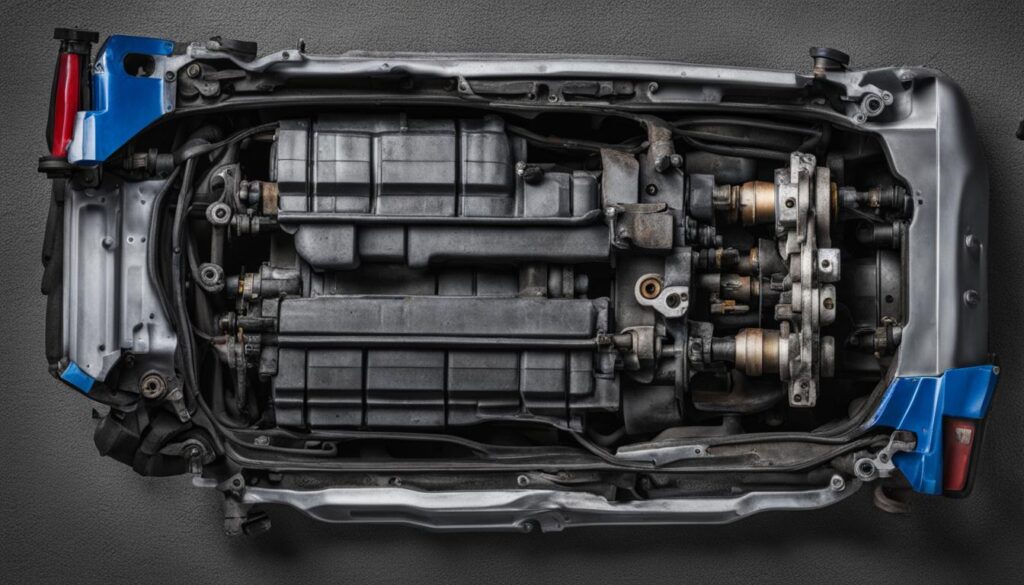The ABS (anti-lock braking system) has been a crucial safety feature in vehicles for nearly a century. As the technology advanced, it became more common in cars and trucks during the 1990s. The ABS system consists of four wheel sensors, an ABS control module, and a hydraulic control unit. Its primary function is to modulate brake application, assisting the driver in steering out of a skid and maintaining control of the vehicle.
However, ABS system failures can occur, compromising the system’s effectiveness and safety. It is important to understand the common causes of ABS system failures to diagnose and address them promptly. Contaminated sensors, damaged sensor wiring, and brake fluid contamination are some of the typical culprits behind ABS system failures. These issues can lead to brake lockup, an unresponsive brake pedal, and unusual noises during braking.
When confronted with ABS system failures, it is crucial to troubleshoot and repair them promptly to ensure optimal safety. Diagnosing the problem involves checking the sensors and wiring for damage or contamination. An ABS scan tool can then be used to identify any fault codes, providing further insight into the underlying issue. Once the cause is determined, repairs can be made, which may include cleaning or replacing sensors, repairing damaged wiring, or replacing the hydraulic control unit.
Regular maintenance and inspections are essential for preventing ABS system failures. By ensuring sensors are clean and wiring is intact, the likelihood of ABS system failure can be minimized. Additionally, proactive troubleshooting and swift repairs can help maintain the system’s efficiency and enhance overall vehicle safety.
Remember, addressing ABS system failures promptly is crucial for safe and reliable braking performance. By understanding the causes and employing proper troubleshooting and repair techniques, you can keep your ABS system functioning optimally, ensuring a safer driving experience.
Key Takeaways:
- Understanding the common causes of ABS system failures is crucial for diagnosing and addressing the issues promptly.
- Contaminated sensors, damaged sensor wiring, and brake fluid contamination are common culprits behind ABS system failures.
- Diagnosing ABS system failures involves checking sensors and wiring for damage or contamination and using an ABS scan tool to identify fault codes.
- Repairs for ABS system failures may include cleaning or replacing sensors, repairing damaged wiring, or replacing the hydraulic control unit.
- Regular maintenance and inspections are essential to prevent ABS system failures and ensure optimal safety.
Symptoms of ABS System Failure
When the ABS system fails, it can manifest in various symptoms. One common sign is brake lockup, where the brakes completely lock up during braking, potentially causing the vehicle to spin out of control. Another symptom is an unresponsive brake pedal, where the pedal may need to be pressed multiple times before the brakes engage. ABS system failure can also cause issues with the speedometer, resulting in an inaccurate reading of the vehicle speed. Additionally, unusual noises, such as random clicks from the brakes, may indicate a problem with the ABS system. When the ABS warning light illuminates on the dashboard, it is important to have the system checked by a professional for proper diagnosis.
Troubleshooting and Repairing ABS System Failures
Troubleshooting ABS system failures is a crucial step in maintaining the safety and performance of your vehicle. When faced with ABS malfunctions, checking the sensors and wiring for damage or contamination should be the first course of action. Metal shavings and debris can cause sensors to provide false feedback to the ABS controller, leading to unnecessary ABS activation or system failure.
An ABS scan tool is a valuable resource in the diagnosis process. It helps identify fault codes and pinpoint the exact cause of the ABS system failure. Once the issue is identified, appropriate repairs must be undertaken to rectify the problem. These repairs may involve cleaning or replacing sensors, repairing damaged wiring, or even replacing the hydraulic control unit.
Prevention is always better than cure when it comes to ABS system failures. Regular maintenance and inspections are vital in ensuring the sensors are clean, and the wiring is intact. This proactive approach can significantly reduce the chances of ABS system failures occurring in the first place, keeping your vehicle safe and performing optimally on the road.
FAQ
What are the common causes of ABS system failures?
Common causes of ABS system failures include contaminated sensors, damaged sensor wiring, and brake fluid contamination.
What are the symptoms of ABS system failure?
Symptoms of ABS system failure include brake lockup, unresponsive brake pedal, issues with the speedometer, and unusual noises while braking.
How can ABS system failures be diagnosed?
ABS system failures can be diagnosed by checking sensors and wiring for damage, as well as using an ABS scan tool to identify fault codes.
How can ABS system failures be prevented?
Regular maintenance and inspections, such as cleaning sensors and ensuring wiring integrity, can help prevent ABS system failures.
How can ABS system failures be repaired?
Repairs for ABS system failures may include cleaning or replacing sensors, repairing damaged wiring, or replacing the hydraulic control unit.




